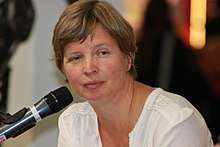Jenny Erpenbeck
Jenny Erpenbeck (born 1967)[1] is a German writer and opera director, recipient of the Independent Foreign Fiction Prize.[2]

Life
Born in East Berlin,[3] Erpenbeck is the daughter of the physicist, philosopher and writer John Erpenbeck and the Arabic translator Doris Kilias.[4] Her grandparents are the authors Fritz Erpenbeck and Hedda Zinner.[5] In Berlin she attended an Advanced High School, where she graduated in 1985. She then completed a two-year apprenticeship as a bookbinder before working at several theaters as props and wardrobe supervisor.
From 1988 to 1990 Erpenbeck studied theatre at the Humboldt University of Berlin. In 1990 she changed her studies to Music Theater Director (studying with, among others, Ruth Berghaus, Heiner Müller and Peter Konwitschny) at the Hanns Eisler Music Conservatory. After the successful completion of her studies in 1994, with a production of Béla Bartók's opera Duke Bluebeard's Castle in her parish church and in the Kunsthaus Tacheles, she spent some time at first as an assistant director at the opera house in Graz, where in 1997 she did her own productions of Schoenberg's Erwartung, Bartók's Duke Bluebeard's Castle and a world premiere of her own piece Cats Have Seven Lives. As a freelance director, she directed in 1998 different opera houses in Germany and Austria, including Monteverdi's L'Orfeo in Aachen, Acis and Galatea at the Berlin State Opera and Wolfgang Amadeus Mozart's Zaide in Nuremberg/Erlangen.
In the 1990s Erpenbeck started a writing career in addition to her directing. She is author of narrative prose and plays: in 1999, History of the Old Child, her debut; in 2001, her collection of stories Trinkets; in 2004, the novella Dictionary; and in February 2008, the novel Visitation. In March 2007, Erpenbeck took over a biweekly column by Nicole Krauss in the Frankfurter Allgemeine Zeitung. In 2015 the English translation of her novel The End Of Days (Aller Tage Abend) won the Independent Foreign Fiction Prize.
Erpenbeck's works have been translated into Danish, English, French, Greek, Hebrew, Dutch, Swedish, Slovene, Spanish, Hungarian, Japanese, Korean, Lithuanian, Norwegian, Polish, Romanian, Arabic, Estonian and Finnish.
Erpenbeck lives in Berlin with her son and her husband, conductor Wolfgang Bozic.[1]
Works
Novels
- Heimsuchung (2008) ISBN 978-3-8218-5773-2 (English translation by Susan Bernofsky: Visitation. 2010. ISBN 978-0811219310.)
- Aller Tage Abend (2012) ISBN 978-0-8112-2192-4 (English translation by Susan Bernofsky: The End of Days. 2014. ISBN 978-0811221931.)
- Gehen, ging, gegangen (2015) ISBN 978-3-8135-0370-8 (English translation by Susan Bernofsky: Go, Went, Gone. 2017. ISBN 978-0811225946.)
Novellas and short story collections
- Geschichte vom alten Kind (1999) ISBN 3-8218-0784-9
- English translation by Susan Bernofsky, with five additional stories from Tand: The Old Child and Other Stories. 2005. ISBN 978-0811216081.)
- Tand (2001) ISBN 3-8218-0696-6
- Wörterbuch (2004) ISBN 3-8218-0742-3 (English translation by Susan Bernofsky: The Book of Words. 2007. ISBN 978-0811217064.)
Plays
- Katzen haben sieben Leben (Cats Have Seven Lives) (2000)
- Leibesübungen für eine Sünderin (Physical Exercises for a Sinner) (2003)
Other
- Dinge, die verschwinden (2009) ISBN 978-3-86971-004-4. Things That Are Disappearing.
- Kein Roman: Texte 1992 bis 2018 (2018). Not a Novel: A Memoir in Pieces, translated by Kurt Beals (2020).
Recognition
- 2001 Jury Prize at the Ingeborg Bachmann Competition in Klagenfurt[6]
- 2001 Several residencies (Ledig Rowohlt House in New York, Künstlerhaus Schloss Wiepersdorf)
- 2004 GEDOK literature prize
- 2006 Winner of the Scholarship Island Writers on Sylt[7]
- 2008 Solothurner Literaturpreis
- 2008 Heimito von Doderer Literature Prize
- 2008 Hertha-Koenig-Literature Prize
- 2009 Award of the North LiteraTour
- 2010 Literature Prize of the Steel Foundation Eisenhüttenstadt[8]
- 2011 Jewish Quarterly-Wingate Prize, shortlisted for Visitation[9]
- 2013 Joseph Breitbach Prize
- 2014 Hans Fallada Prize
- 2015 Independent Foreign Fiction Prize, winner for The End of Days (prize shared with the book's translator, Susan Bernofsky)[10]
- 2016 International Dublin Literary Award, shortlisted for The End of Days
- 2016 Thomas Mann Prize[11]
- 2017 Strega European Prize
- 2017 Order of Merit of the Federal Republic of Germany[12]
- The Guardian ranked Visitation #90 in its list of 100 Best Books of the 21st Century.[13]
References
- "Jenny Erpenbeck: Vom Ausgelieferstein" (in German). Freiburger Nachrichten. Retrieved 5 February 2019.
- "Jenny Erpenbeck wins Independent foreign fiction prize". Guardian. Retrieved 5 February 2019.
- "Jenny Erpenbeck". New Books in German. Archived from the original on 28 September 2011. Retrieved 17 April 2011.
- "Jenny Erpenbeck: Vom Ausgelieferstein". Freiburger Nachrichten. Retrieved 5 February 2019.
- "Und immer wieder der Tod". Die Zeit. Retrieved 5 February 2017.
- Ingeborg-Bachmann-Preis (2 July 2001). "Die AutorInnen bei den Tagen der deutschsprachigen Literatur 2001". ORF Kärnten (in German). Archived from the original on 6 July 2011. Retrieved 28 May 2009.
- Inselschreiber. "Jenny Erpenbeck : Preisträger 2006". Kunstraum-Sylt Quelle (in German). Archived from the original on October 23, 2007. Retrieved 10 July 2008.
- ArcelorMittal Eisenhüttenstadt GmbH - 1. November 2010 - Verleihung Stahl-Literaturpreis 2010(in German)
- Jewish Quarterly-Wingate Prize 2011 Archived 2012-02-25 at the Wayback Machine
- Nick Clark (May 27, 2015). "Independent Foreign Fiction Prize 2015: Jenny Erpenbeck wins with 'work of genius'". The Independent.
- (www.dw.com), Deutsche Welle. "Novelist Jenny Erpenbeck wins Thomas Mann Prize | Books | DW.COM | 03.05.2016". DW.COM. Retrieved 2016-05-05.
- http://www.bundespraesident.de/SharedDocs/Berichte/DE/Frank-Walter-Steinmeier/2017/10/171004-Verdienstorden-TdDE.html
- "100 Best Books of the 21st Century". Retrieved December 8, 2019.
Further reading
- Bartel, Heike and Elizabeth Boa (eds.) Pushing at Boundaries: Approaches to Contemporary German Women Writers from Karen Duve to Jenny Erpenbeck. Amsterdam: Rodopi, 2006. ISBN 978-90-420-2051-1. Amsterdam
- Wiebke, Eden. "To Express with Words, was Always the Next," in No Fear of Big Emotions. Frankfurt am Main: Fischer-Taschenbuch-Verlag, 2003. ISBN 3-596-15474-X, pp. 13–32 (Jenny Erpenbeck interview)